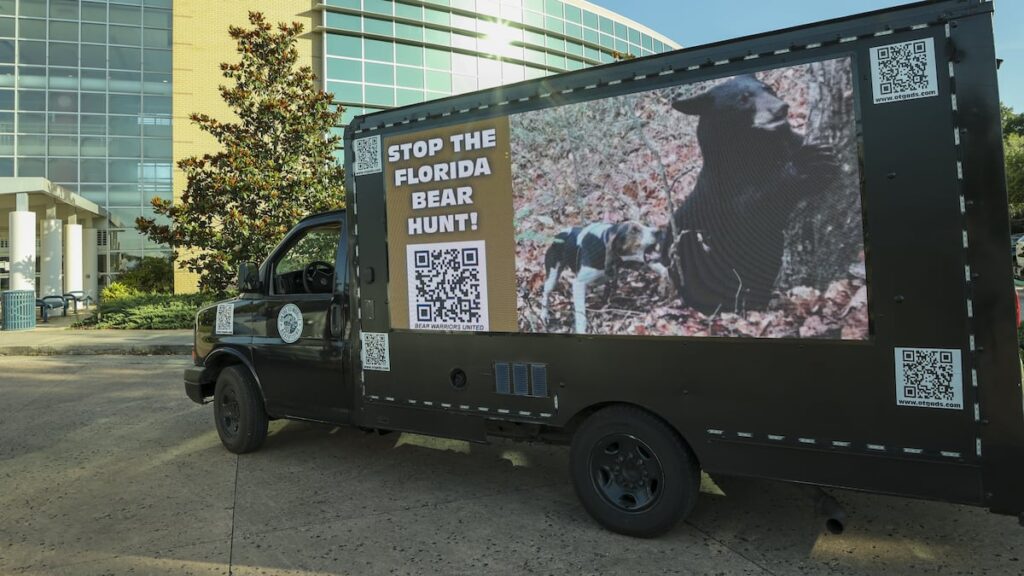Florida is moving forward once again with the proposed black bear hunt that begins this year and continues for years to come. The Florida Fish and Wildlife Conservation Commission owes it to the people of our state to allow us to hear our voices meaningfully in order to make this important decision.
I was one of dozens of Floridians who gathered in the conference room on May 21st, waiting for the commissioner to hurry and urge them to abandon the unfair bear hunting proposal.
The committee only offered the public for two days to review the proposal and submit written comments, with in-person comments being limited to one minute. Like many others at the meeting, I was cut off before I could say anything.
So I’m taking advantage of this opportunity to share my thoughts on this unthinkable proposal now.
When Florida is entertaining the development of state parks and trading valuable reserves, Floridians’ trust in our conservation staff is naturally unstable. Our wildlife officials should make thoughtful, common sense and science-based decisions, but it was clear from the start that this proposed Bear Hunt is a single commissioner pet project.
During the committee’s December meeting, staff discussed the statewide bear population moving in the right direction, but three of the seven subpopulations are still too small to ensure long-term genetic health. They explained that there is still plenty of habitat for our black bear population to grow sustainably, and how the prevention and management of human interactions was widely successful.
But despite that welcome news, information on bear populations across the state is incomplete and will not end for several years. Therefore, staff did not have any recommendations for changing their current management strategies.
Nevertheless, Commissioner Gary Lester requested staff to develop bear hunting proposals.
It appears to me that staff have been scrambling to reverse engineer the proposed hunt justification. The line they came up with arguing that “we need to balance species numbers with appropriate habitat and maintain a healthy population.” However, when they announced in December, there was clearly enough habitat. It won’t be summed up.
And having full population data is important to the committee’s own Black Bear Management Plan goals and is not yet met. The plan calls for the maintenance of long-term, sustainable black bear populations in habitats across Florida. The main part of reaching that goal means supporting interconnected bear groups to ensure genetic flow and health.
Spend your days with Hayes
Subscribe to our free Stephenly newsletter
Columnist Stephanie Hayes shares thoughts, feelings and interesting business with you every Monday.
You’re all signed up!
Want more free weekly newsletters in your inbox? Let’s get started.
Check out all options
Unfortunately, the three bear subpopulations are currently too small to last on their own. For example, subpopulations of bears in the south and central regions must grow and connect with nearby southern and central subpopulations where hunting is proposed.
It is totally irresponsible for the committee to allow hunts before meeting its own modest recovery goals. At the very least, commissioners need to carefully analyze and explain how killing bears in these nearby populations does not harm the agency’s own long-standing work to increase bear immigration between the populations.
It is clear that the risk of this hunt far outweighs the supposed benefits of Florida’s adoring black bears.
It is also confusing that the committee appears to have learned nothing after he hastily allowed the hunt in 2015. The hunt denounced the Cubs for their allocations exceeded and still being an incompetent, savage disaster in which the entertainment mama bear was carried out, and for denouncement of uncertain fate.
Floridians have returned once again real concerns about this rushing proposal, sold as “conservation management.” We haven’t bought it and you shouldn’t.
The committee will need to wait several more years to update the bear population information across the updated range. In the meantime, staff should be recommended for their stunning work in managing human interactions and strengthening weaker bear subpopulations.
All we are looking for is a proposal backed by thoroughly considered science. Commissioners must take the time to do their job correctly. Now is the perfect time to regain public trust.
Elise Bennett is a senior attorney at the Center for Biodiversity and program director for Florida and the Caribbean. This opinion article was distributed by the invading sea website (www.theinvadingsea.com). It publishes news and commentary on climate change and other environmental issues affecting Florida.

